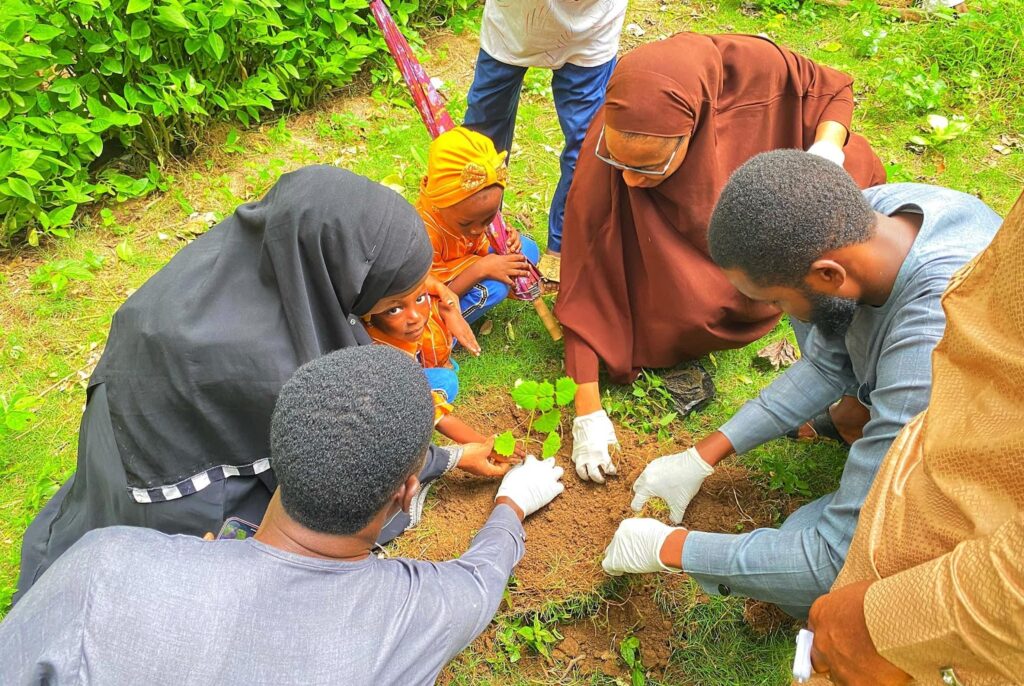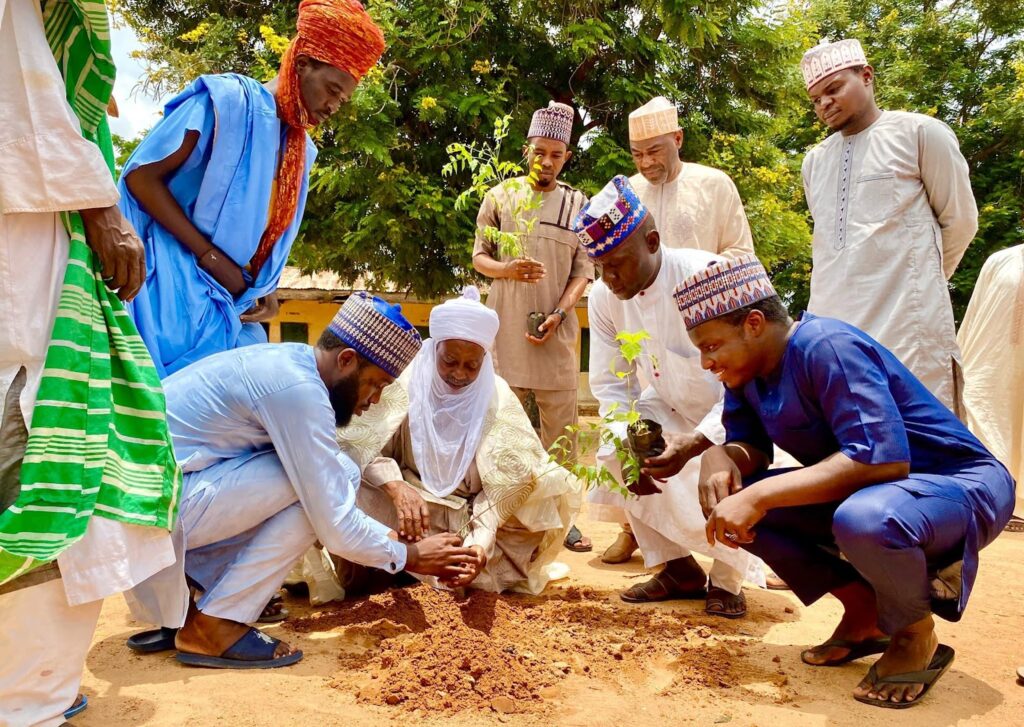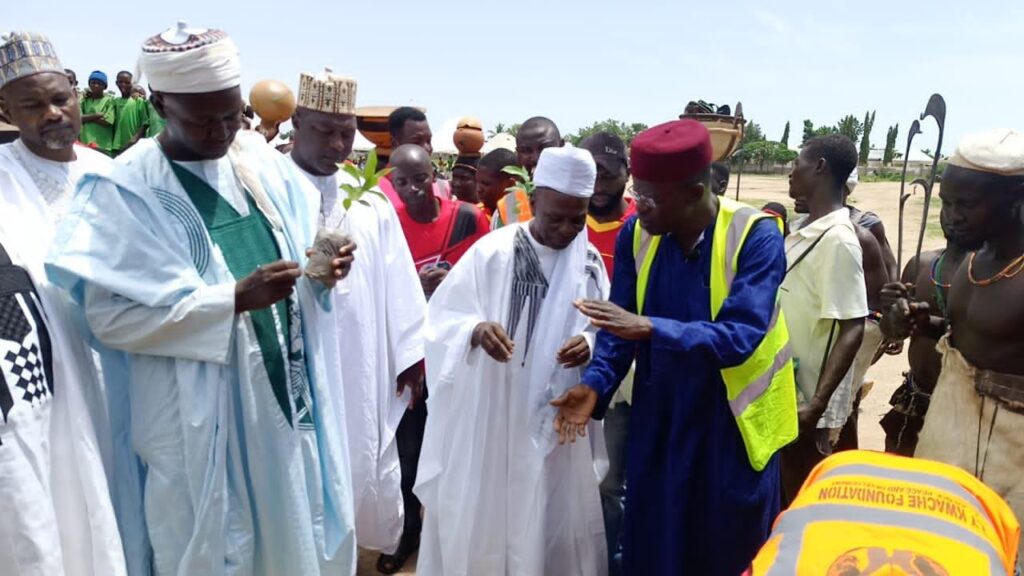Growing up in the Biu local government area of Borno State in North East Nigeria, Usman Aliyu enjoyed different types of fruits every quarter, and the climate on the Biu Plateau, a highland area containing many extinct volcanoes, was favourable during his entire primary and secondary education.
“Each season of three months has its unique fruit – mango, guava, pawpaw, et cetera,” he said while speaking with HumAngle about the landscape characterised by scrub vegetation interwoven with tall trees and woodland.
Like Aliyu, both Iliya Yame Kwache and Abdullahi Haruna experienced a similar atmosphere growing up in Adamawa and Kano States, respectively. While Adamawa has a landscape dominated by lush savanna tree species, including shade-providing trees and fruit trees, Kano state, which is the largest industrial hub in northern Nigeria, used to be adorned with lush trees, including baobab, palm, dates, and more, providing a refreshing atmosphere for its residents.
But as agricultural expansion, logging, urbanisation, and widespread use of fire wood became more apparent, these vibrant environments gradually lost their beauty to deforestation.
“The green environment of today cannot be compared to the greenery of yesterday. The price of kerosene was much cheaper back then. Buying kerosene was more economical than resorting to the cutting down of trees,” said Aliyu, reflecting on the economic hardship forcing Nigerians to use firewood for cooking.
Disturbed by the environmental changes, unique solutions emerged for each region. While the Zulum Go Green Initiative has stepped up to save the environment in Borno, the Iliya Yame Kwache Foundation is taking charge in Adamawa, and the Panacea Foundation has also embarked on planting trees in Kano.
Restoring the greenery through campaigns
During his Postgraduate Diploma (PGD) research at the University of Maiduguri in 2013, Aliyu contemplated various ways to mitigate the effects of climate change in Borno. Then, he thought of an idea – reducing the emission of carbon dioxide through tree planting. So, he started a public awareness and massive tree-planting campaign after his PGD in Environmental Management.
The campaign would later be metamorphosed into the Zulum Go Green Initiative with the project #OwnATreeBeforeYourLastBreath. The project was to encourage local participation through the provision of free tree seedlings to community members that assured him of nurturing and protecting the trees.
“One of the strategies I used was a tree-planting campaign. That was how I started tree-planting in my community.”

Some of the communities where his trees were planted in Borno include Kaleri, Shettimari, Sulumri, Kumshe, and even tertiary institutions like the Borno State University, the Ramat Polytechnic, and the University of Maiduguri.
At Biu local government, he created another initiative called “The Biu Emirate Environmental Management Initiative” to collaborate with students of higher institutions from the region and community leaders. He sends them tree seedlings annually to plant across the communities.
About 146 miles away, the green environment of Michika in Adamawa is also being restored by Kwache, a legal practitioner determined to create awareness about the importance of mass tree planting in rural and urban communities.
He launched the Iliya Yame Kwache Foundation in 2021 with a long-term plan and mission to restore the lush green glory of his state and halt desertification in its entirety.
He has since then been able to Green Michika, Demsa, and other communities in Adamawa with shade-providing and economical trees.
In Kano, the Panacea Foundation was launched in 2018 for the purpose of reducing the carbon dioxide emitted by vehicles and industries through “tree planting and environmental sensitisation among schools and local communities.” To maximise local participation, the foundation creates awareness and sensitisation.
“Our initiatives are centred around awareness and sensitisation because we want our communities to embrace the culture of planting and nurturing trees. Before we carry out any planting exercise, we usually engage communities through their traditional rulers,” said Haruna, the secretary of the foundation.
“During the engagements, we discuss the importance of planting and nurturing trees in curbing the effects of climate change, such as intense heat and flooding that has ravaged some of our communities. We also ensure to caution them about the role of cutting down trees in exacerbating the above-mentioned effects.”
The Panacea Foundation involves youths in all aspects of its activities from sourcing seedlings, surveying plantation sites, delivering seedlings to sites, planting seedlings, monitoring and evaluation.

‘What we have done’
In Maiduguri, the Zulum Go Green has planted over 3000 shade-providing and economical trees. The organisation plants species like neem, African birch, tamarind, and moringa trees. In schools, the initiative has planted guava, pawpaw, orange, and cashew trees to provide practical learning opportunities and a source of nutrition.

“The economic/fruit-bearing trees will serve as a source of income for the community, mitigate malnutrition and checkmate climate change,” Aliyu explained.
In 2023 alone, Aliyu and his team planted approximately 2000 seedlings in Maiduguri and its environments.
Similarly, Michika, Demsa, and other communities in Adamawa have witnessed a remarkable transformation over the past three years through the efforts of the Iliya Yame Kwache Foundation.
“So far, we have been able to plant and distribute over 50,000 tree seedlings since we commenced this program in 2021,” Kwache told HumAngle.
Kwache’s impactful work has inspired the Adamawa State government, Michika Local Government Council, and the Lutheran Church of Christ in Nigeria (LCCN), who invited him to lecture over 1000 pastors on the success of the vision.
In Kano, the Panacea Foundation has carried out numerous sensitisation programs and established orchards in schools and across the local government areas.
“We have planted in Tudun Yola, Danbatta, Gwani Dan Zarga Schools, Kano Zoological Garden…among others,” Haruna explained. “I am thrilled to see that these communities embrace the seedlings as theirs. They took care of them and now they have become mature trees.”

Impact
At the Zulum Go Green Initiative, Aliyu and his team take pride in the positive impact of the trees they have planted, emphasising the improved air quality in communities.
“Our campaign has been very effective, as community members are eager to acquire tree seedlings from us to plant. So far, they have been protecting and nurturing the planted seedlings. We pay water vendors in some of the communities to nurture the trees on a weekly basis.”
In Michika, Kwache also expressed satisfaction with the impact of the tree-planting initiatives. “Many of the recipients of our tree seedlings have come back to testify and thank us for this benevolence. The trees we have planted stopped erosion in some places in Michika.”
The success has prompted neighbouring communities from Gombi, Madagali, and Maiha local governments to seek donations of
“The local communities are our backbone because the essence of the tree planting exercise is to save and serve the community. The traditional rulers, community leaders, religious leaders and school children are always invited to our exercises so that children will grow with the mindset of planting trees.”

‘This is not a lone fight’
While the Borno State Ministry of Environment recognises the efforts of the Zulum Go Green Initiative and has partnered with them on many of their environmental activities, the Iliya Yame Kwache Foundation has received support from the Adamawa State government and Michika Local Government Council.
Also, the Panacea Foundation has collaborated with government bodies such as the Ministry of Environment and Forestry Research Institute of Nigeria, as well as local communities through traditional institutions and community-based organisations (CBOs).
The foundation also receives seedling donations from like-minded individuals.
A tough walk
“The major challenge we are facing is funding and partnership. We lack financial support. Over the years, we have never received financial support from either the government or NGOs. The support so far is from family and friends, Aliyu told HumAngle.
He is, however, optimistic about planting 10 million tree seedlings in Borno and its environs before 2030.
Similarly, Kwache said he’s literally funding the mass tree planting campaign from his salary even though “some social miscreants are destroying the trees already planted and even hedged. This is devastating to us.”
“Information is power, and the mass media, like you, has been effective in disseminating information about the campaign. Secondly, the strategy of encouraging schoolchildren to participate has been very effective. We have written to the Great Green Wall to partner with us going forward because our vision is to continue to plant trees and dig dams and canals as long-term plans.”
For 2024, Kwache intends to expand the tree-planting exercise to Yola, Demsa and Mayo Belwa.
Support Our Journalism
There are millions of ordinary people affected by conflict in Africa whose stories are missing in the mainstream media. HumAngle is determined to tell those challenging and under-reported stories, hoping that the people impacted by these conflicts will find the safety and security they deserve.
To ensure that we continue to provide public service coverage, we have a small favour to ask you. We want you to be part of our journalistic endeavour by contributing a token to us.
Your donation will further promote a robust, free, and independent media.


